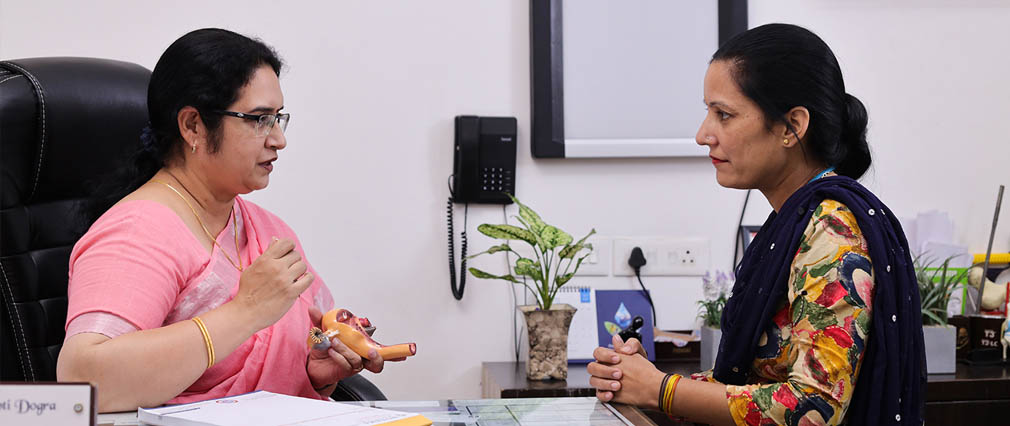
Uterine Fibroids: Diagnosis and Treatment at Meerut Gynaecologist
Uterine fibroids are non-cancerous growths that develop within the uterus. These benign tumors are common among women of reproductive age and can vary in size, from small seedlings to large masses that distort the uterus. While many women with fibroids experience no symptoms, others may face significant discomfort, heavy menstrual bleeding, or fertility issues.
Types of Uterine Fibroids
- Intramural Fibroids: Located within the muscular wall of the uterus.
- Subserosal Fibroids: Grow on the outer surface of the uterus.
- Submucosal Fibroids: Develop in the inner lining of the uterus and may protrude into the uterine cavity.
- Pedunculated Fibroids: Attached to the uterus by a thin stalk.
Causes of Uterine Fibroids
While the exact cause remains unclear, uterine fibroids are often linked to hormonal imbalances and genetic factors. Estrogen and progesterone, the hormones responsible for regulating the menstrual cycle, appear to stimulate the growth of fibroids. Risk factors include family history, obesity, and early onset of menstruation.
Diagnosis and Treatment by Dr. Deepti Dogra at Meerut Gynaecologist
Dr. Deepti Dogra, with her extensive experience, specializes in diagnosing and treating uterine fibroids at Meerut Gynaecologist. Diagnosis typically involves a thorough medical history, pelvic examination, and advanced imaging techniques such as ultrasound or MRI to determine the size, location, and number of fibroids.
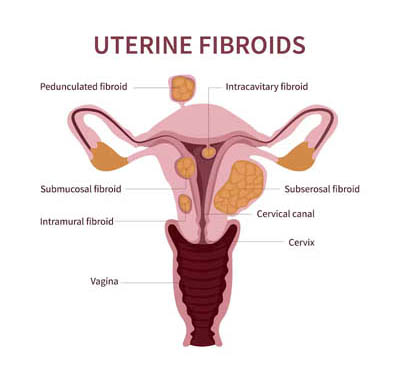
Treatment options offered by Dr. Dogra include:
- Medication: Hormonal therapies to regulate menstrual cycles and reduce symptoms.
- Minimally Invasive Surgery: Advanced laparoscopic and hysteroscopic techniques to remove fibroids while preserving the uterus.
- Myomectomy: Surgical removal of fibroids, ideal for women planning to conceive.
- Hysterectomy: For severe cases, Dr. Dogra performs laparoscopic hysterectomies to ensure a swift recovery.
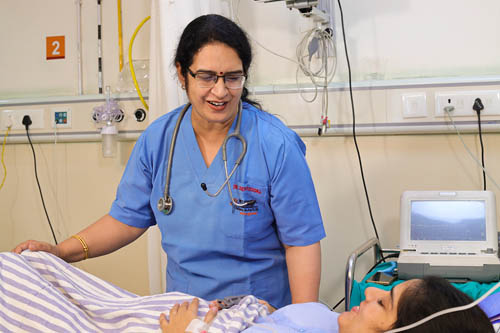
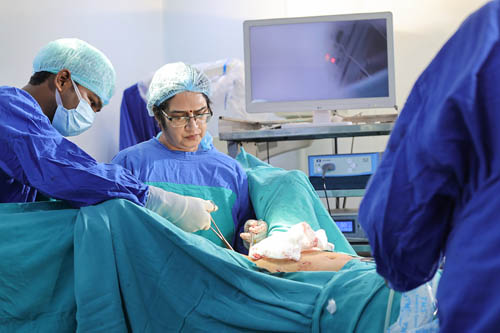
At Meerut Gynaecologist, Dr. Deepti Dogra combines medical expertise with compassionate care, tailoring treatment plans to each patient’s needs. Trust MG for effective management of uterine fibroids and a path to better health.
FAQs for Uterine Fibroids at Meerut Gynaecologist
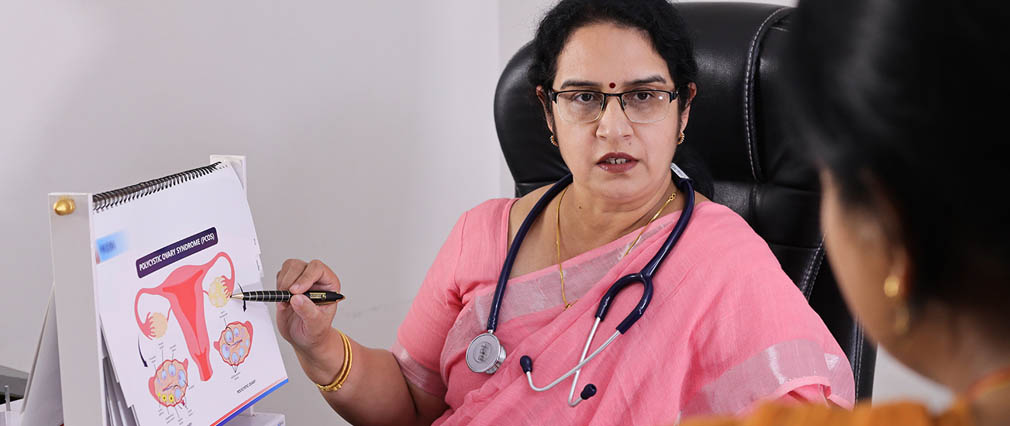
Adenomyosis: Diagnosis and Treatment at Meerut Gynaecologist
Adenomyosis is a condition where the inner lining of the uterus (endometrium) invades the muscular wall of the uterus (myometrium). This leads to uterine enlargement and symptoms such as heavy menstrual bleeding, severe cramps, and chronic pelvic pain. It typically affects women in their late 30s to 40s and is more common among those who have given birth.
Types of Adenomyosis
- Focal Adenomyosis: Confined to specific areas of the uterus.
- Diffuse Adenomyosis: Spread extensively throughout the uterine muscle.
Causes of Adenomyosis
While the precise cause of adenomyosis remains unknown, possible factors include:
- Hormonal influences, particularly excess estrogen.
- Uterine trauma caused by surgeries like cesarean sections or dilation and curettage (D&C).
- Chronic inflammation of the uterine lining postpartum.
Diagnosis and Treatment by Dr. Deepti Dogra at Meerut Gynaecologist
At Meerut Gynaecologist, Dr. Deepti Dogra offers expert diagnosis and tailored treatment plans for adenomyosis. Diagnostic steps include:
- Advanced Imaging: Ultrasound and MRI to detect uterine wall abnormalities.
- Clinical Examination: To assess uterine size, tenderness, and other symptoms.
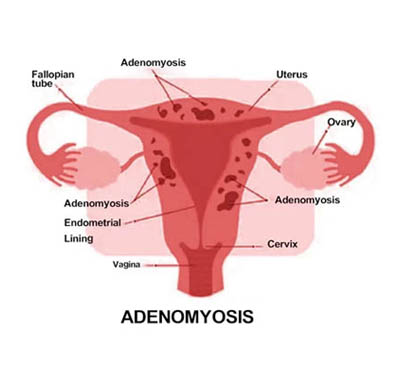
Treatment options include:
- Medications: Hormonal therapies to alleviate pain, control bleeding, and reduce uterine inflammation.
- Laparoscopic Procedures: Minimally invasive techniques to remove affected tissues while preserving the uterus.
- Hysterectomy: For severe cases, Dr. Dogra performs laparoscopic hysterectomies with precision, ensuring quick recovery and minimal discomfort.
With a commitment to excellence, Dr. Deepti Dogra and the team at Meerut Gynaecologist deliver compassionate and personalized care for women suffering from adenomyosis.
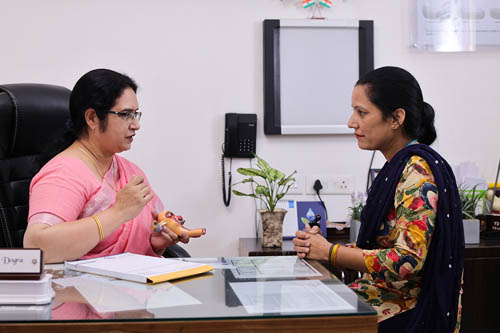
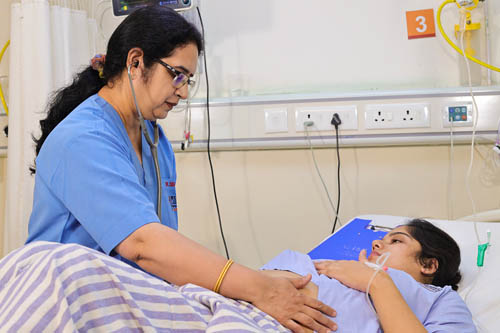
Take Charge of Your Health Today!
Don’t let adenomyosis disrupt your life. Schedule your consultation with Dr. Deepti Dogra at Meerut Gynaecologist and explore advanced, minimally invasive solutions for lasting relief. Your health and well-being are just a call away!
FAQs for Adenomyosis at Meerut Gynaecologist
- Medication: Hormonal therapies or anti-inflammatory drugs.
- Non-Surgical Methods: Uterine artery embolization to reduce blood flow to the affected area.
- Surgical Treatment: Hysterectomy for severe cases. Dr. Deepti Dogra offers personalized treatment plans for her patients in Meerut.


